Food Trucks Banned On Brady Street
Council okays ban request by business improvement district. Mayor must approve.
Area alderman Nik Kovac secured unanimous approval for legislation that bans food trucks along E. Brady St. at today’s meeting of the Common Council. Kovac noted there was support for the idea from a number of stakeholders in the area, including Brady Street Business Improvement District executive director Steph Salvia, BID chair and Casablanca owner Alaa Musa and Dogg Haus owner Mazen Muna (see update below for more information on the BID’s plans).
“In many cases the food trucks are selling the same food as the brick-and-mortar businesses and parking right in front of them,” Kovac told the council. He also noted the trucks occupy a number of parking spaces along the busy street.
In a follow-up interview with Urban Milwaukee, Kovac noted he didn’t introduce the proposal at the Public Works Committee because the matter came up after the meeting and he wanted to get it taken care of in a hurry to support Brady Street businesses. Kovac noted that “food trucks are still welcome on the East Side, just not right in front of businesses they’re competing with… I’m certainly not trying to be unwelcoming to food trucks in general, but they should be courteous to their peers.”
Kovac’s move is not without precedent. In 2015 the late alderman Joe Dudzik proposed legislation regarding “selling articles from parked vehicles” that would have effectively banned food trucks from the entire 11th aldermanic district. That legislation, which generated substantial opposition from food trucks, was rejected by the full council by a 10-to-4 vote. Kovac voted in opposition to that restriction.
The Brady Street ban will apply to the boundaries of the Brady Street Business Improvement District. The district runs the length of Brady Street from N. Jackson St. on the west to N. Farwell Ave. on the east with short branches out on the intersection streets. The ban, if signed by mayor Tom Barrett, would be in effect on all days of the week.
UPDATE: Alaa Musa, who chairs the business improvement district, reached out to tell Urban Milwaukee that “I am currently working with the board on ways that we can accommodate the business owners request, but also allow food trucks to be on the street with added restrictions. In the coming weeks we will be working closely with the alderman and the city to come to a resolution that will hopefully satisfy all parties.”
If you think stories like this are important, become a member of Urban Milwaukee and help support real independent journalism. Plus you get some cool added benefits, all detailed here.
Milwaukee Food Trucks
If you think stories like this are important, become a member of Urban Milwaukee and help support real, independent journalism. Plus you get some cool added benefits.
More about the Food Truck regulatory framework
- City Hall: Proposal Would Allow Food Trucks To Return To W. Capitol Drive - Jeramey Jannene - Mar 29th, 2024
- Burnham Park Food Truck Zone Unveiled - Sophie Bolich - Aug 9th, 2023
- Food Trucks Banned On Portion of W. Silver Spring Drive - Jeramey Jannene - Jul 31st, 2023
- City Hall: New Food Truck Restrictions Approved - Jeramey Jannene - May 31st, 2023
- City Hall: Food Trucks Face New Restrictions - Jeramey Jannene - May 16th, 2023
- City Hall: New Proposal Would Regulate When, Where And How Food Trucks Operate - Jeramey Jannene - May 11th, 2023
- City Hall: Council Bans Food Trucks Along Four Blocks of Water Street - Jeramey Jannene - Apr 18th, 2023
- City Hall: Food Truck Ban for Downer Ave. Proposed - Jeramey Jannene - Jul 20th, 2020
- Taco Truck Issue Still Not Settled - Edgar Mendez - May 6th, 2019
- City Hall: Food Truck Truce Reached - Jeramey Jannene - Mar 26th, 2019
Read more about Food Truck regulatory framework here
Political Contributions Tracker
Displaying political contributions between people mentioned in this story. Learn more.
- February 11, 2016 - Nik Kovac received $790 from Alaa Musa


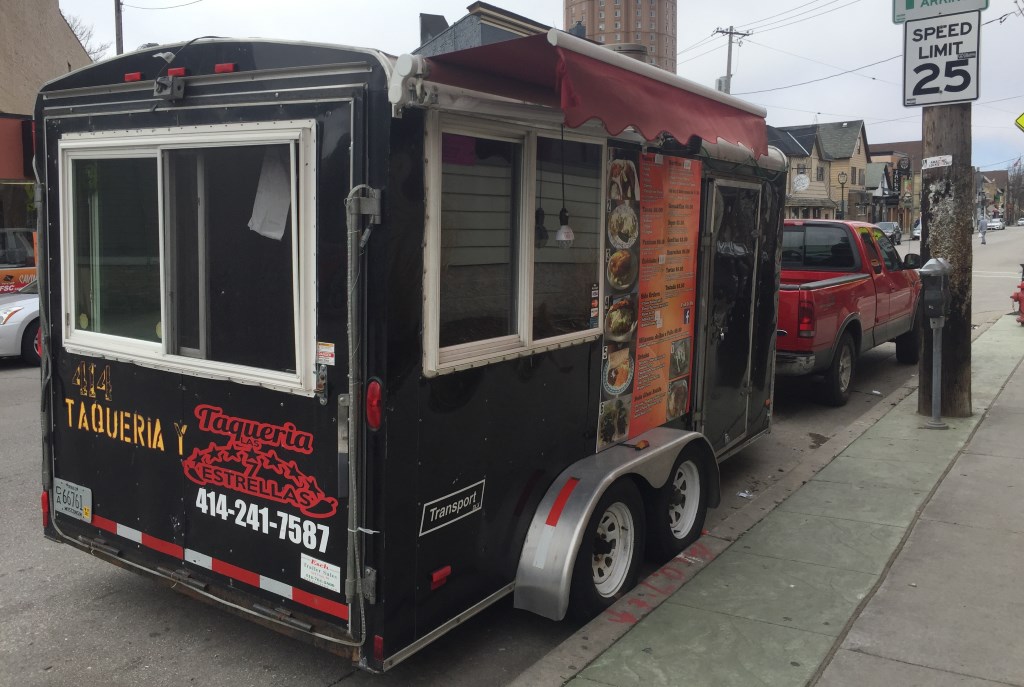
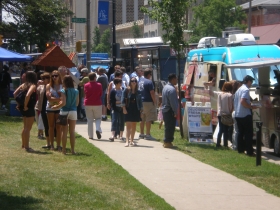
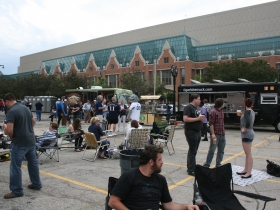
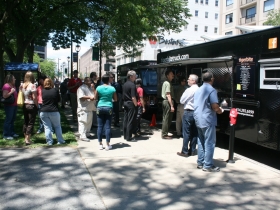
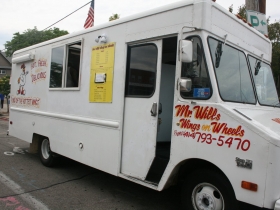
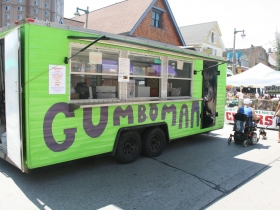
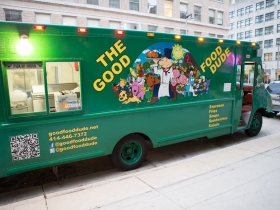

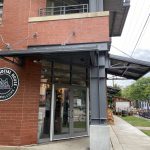















Seriously? I’ve seen the pictured Taco truck along with the new Punjabi Accent truck on Brady maybe a couple of days a week. Maybe people just don’t like the Dogg Haus and would rather eat from a truck? The soon to open Qdoba would face the most competition seeing as the taco truck tacos are better than theirs.
This is the end of the Wild West for food trucks. Respect your neighbors or face regulations. They are literally parking trucks at the front door of restaurants on Downer Ave. They’ll be the next area to ban the trucks.
So would Kovac put forth legislation to outlaw any new hog dog restaurants if there’s already a hot dog restaurant on the block?!
This is asinine. Most of the trucks I see in front of Walgreens are taco trucks. I’m sorry, but where are all the taco restaurants on Brady that they’re hurting?
This is just ridiculous. There is an enormous parking lot to accommodate other businesses’ customers. “In many cases the food trucks are selling the same food as the brick-and-mortar businesses and parking right in front of them,” Kovac told the council. The taco truck is completing with absolutely no one…QDoba isn’t even Mexican food; the Dogg Haus? Casablanca way up the street and which has nothing to do with Mexican food?
The taco truck started parking on Brady during the World Cup. The Nomad was serving tacos the whole time. As far as the Dogg Haus. There are multiple other trucks that I’ve seen that park across the street that sell dogs and Italian Beef. I live on brady and support this.
The bottom line: It’s about keeping business owners happy, not necessarily catering to the interested of people who live and work in the area who might enjoy a change of pace and a chance for a quick nosh. It comes down to who is keeping politicians’ bread buttered.
After seeing the drawings of Qdoba on Brady, I’d suggest the food truck operators join together, buy that property, tear it down, re-pave with nice fresh asphalt, and mark out stalls. Similar visual ambience, plus, they would then be actual property owners.
Another great idea from the same self-serving people who didn’t bring you Camp but who did ok the monstrosity that looks like it belongs in the Mayfair parking lot – Casablanca. I know this has nothing to do with the food trucks selling similar food either since there are three places within a hundred feet of each other where you can get a mediocre burger.
BID’s are funded by an assessment on business owners within the boundaries. If you don’t protect the businesses the BID dies. If you notice the Punjabi truck is now parking juuuusst a bit outside the BID district on Brady east of Farwell, effectively skirting the ban.
Terry Kiley, there still is an open lot for development on Brady Street still… would be a great place for food stalls!!
Liz, Camp Bar wasn’t run out… that article was overblown.
This is much ado about nothing.
It seems like a fair compromise to keep them out of the BID, where the food trucks are ‘free riders’. It’s not so restrictive, so the trucks can park just a few steps away. I’m also glad this only applies to Brady Street and maybe a few others BIDs down the line.
I wouldn’t want to see a ban like this expanded to cover Downtown.
Sad to see this sort of provincialism on Brady Street. Surely there’s a solution that isn’t an outright ban. This mindset further exacerbates Milwaukee’s reputation as an either/or town. The most livable cities in the world recognize that more reasons for more people to want to go a place is good for everyone.
Hopefully another neighborhood will recognize an opportunity to say yes to micro-entrepreneurialism that enlivens the public realm. Take a page from Portland or Austin’s playbook, and create permanent food cart pods.
Let the marketplace decide. Do you think perhaps some folks stop for lunch on Brady and even shop at stores there BECAUSE there’s a food truck option they enjoy? What’s the next big decision … shut down tailgating at Miller Park so the Brewers sell more beer and brats?
Right: Government must not allow destructive competition by upstart businesses which are providing a product people want at prices people are willing to pay.
Politically connected businesses using government to shut out competition is the New American Way.
Right: Government must not allow destructive competition by upstart businesses which are providing a product people want at prices people are willing to pay.
Politically connected businesses using government to shut out competition is the New American Way, Citizen.
What a shock. The legislation enjoys the support of the business owners who do not want to compete. I wonder how many consumers were consulted before connecting this ridiculous legislation
If Kovac was smart he would send the health inspector to Brady street every month to inspect the tax dodgers.
Banning is a racist stance and protects established businesses. Kovac could have easily set an ordinance for an area for them to operate. Calling for a ban is sending a subtle message–you don’t want dark people selling in the area creating competition.
Banning is a racist stance and protects established businesses. Kovac could have easily set an ordinance for an area for them to operate. Calling for a ban is sending a subtle message–you don’t want dark people selling in the area.
Robert – How is it a racist stance? There have been other bans in the city affecting mostly caucasian run food trucks…
CJ…please enlighten me on any of those bans. I honestly am not awear of any.
I guess Chicago is inspiration for Milwaukee. Follow Chicago model for shutting down food truck competitors. Is this only the beginning of the end for food trucks in Milwaukee.
“According to Matt Geller, founder of the National Food Truck Association and CEO of the Southern California Mobile Food Vendors Association, no major city but Chicago restricts where food trucks can park and how long they can remain in one place. “That’s the only big city where that’s happening,” he says. “If I was a citizen in Chicago, I’d be appalled.”
Why Chicago’s once-promising food truck scene stalled out | Food & Drink Feature | Chicago Reader
http://m.chicagoreader.com/chicago/food-trucks-decline-parking-ticket-fines-ordinance/Content?oid=26035054
CJ…please be blighted me regarding these bans you speak of.
I guess we know now where Milwaukee gets its inspiration from. Follow Chicago model for shutting down food truck competitors. Is this beginning of the end for food trucks in Milwaukee?
“According to Matt Geller, founder of the National Food Truck Association and CEO of the Southern California Mobile Food Vendors Association, no major city but Chicago restricts where food trucks can park and how long they can remain in one place. “That’s the only big city where that’s happening,” he says. “If I was a citizen in Chicago, I’d be appalled.”
Why Chicago’s once-promising food truck scene stalled out | Food & Drink Feature | Chicago Reader
http://m.chicagoreader.com/chicago/food-trucks-decline-parking-ticket-fines-ordinance/Content?oid=26035054
Cathedral Square businesses banned food trucks except for special events, used to have Food Truck Fridays… They also said food trucks were hurting their business.
Same-old-same-old: Businesses around Cathedral Square were able to ban carry-in beverages to Jazz in the Park (to protect those businesses). Bartolotta’s/ Harbor House was able to get a ban on carry-in drinks AND food at “free” lakefront film events. These events are all held in public parks. And Harbor House gets to operate several of their restaurants on public land in what I hear are pretty sweet deals.
I agree with Chris (# 12). When will provincial Milwaukee catch up to thriving cities with policies that that support a wide range of commerce at all price points–and thus give the public added value–not just businesses?
Miranda, knows a lot more about the race issue than running a business or a non profit.
CJ…your point doesn’t address white food truck owners being targeted. How do you know those food trucks were not owned by people of color?
Jason #26 – here’s a little of the backstory MJS would not report regarding Esperanza Unida. The illegal loans given to my predecesor killed that agency. White privilege.
Esperanza Unida Official Statement: Unauthorized Loans Created Toxic Debt Agency Could Not Possibly Control
FORECLOSURE OF 611 INTERNATIONAL BUILDING
DATE: JANUARY 5, 2015
On January 5, 2015 the City of Milwaukee will take ownership of the title of the 611 West National Avenue Building via foreclosure. The foreclosure allows for extinguishing toxic debt, asset disposal at a fair price, and supporting economic development in the Milwaukee South Side. Esperanza Unida has worked closely with the City of Milwaukee to ensure a smooth transition and the start of a new chapter.
In 2013, Esperanza Unida conducted numerous improvements to the 611 West National Building. These physical improvements increased the valuation of the building from an estimated $600,000 to the current asking price of $1.3 million. In 2013, Former Secretary Manny Perez was brought in to restructure the corporation. Addressing these issues involved many difficult decisions given the financial complexity and toxicity of the problems and the lack of economic development in the Milwaukee South Side.
Nevertheless, since 2013 Esperanza Unida has trained 140 workers in forklift operations, has provided transportation services to workers within 50 mile radius, and has helped 30 transitional workers with work experience aimed at empowering them to become self- sufficient.
At the root of the issues is inappropriate loans made against the 611 International Building approved by the 1994 Board of Directors and Executive Director, Richard Oulahan. These loans – in the amount of $790,000- were made in addition to the original loan of the project as revolving lines of credit after the initial renovation project was completed. According to BMO Harris, until at least 2002 then Executive Director Richard Oulahansigned for loans using the preexisting loan as line of credit and the 611 West National Building and the 1329 Building as collateral. From a compliance and sale standpoint, these issues were brought to the attention of the US Department of Commerce Economic Development Authority by Executive Director Manuel Perez.
The debt crippled the organization financially as it set it in a course of chronic indebtedness and lower revenues that became more complex as the organization fell behind in IRS taxes, UI, DOR, and many others and it caused serious disrepair due to lack of maintenance and repair budgets. This was worsened by the downturn in the economy.
A sale could not occur due to the restrictions imposed by the US Department of Commerce on the sale of the property. The foreclosure effectively prevents that the tax payers of the City of Milwaukee pay $712,000 to the US Department of Commerce given that the City of Milwaukee is a co-applicant of the 611 International Building. The lack of economic development in the Milwaukee South Side prevents attracting tenants that can sustain proper rental rates.
Those factors –together with the existence of accumulated toxic debt- justify the need for ownership to be transferred to a qualified investor that can infuse capital to the 611 Building, to conduct additional improvements that the building will need, and accelerate economic development along 6th and National Avenue. This should also contribute to creating additional jobs in a community that is in serious need of economic development and job creation.
As we move forward in the sanitization process at Esperanza Unida, we motivate the entire Milwaukee South Side community and government leaders to unite to stimulate needed economic development and job creation in the Milwaukee South Side. This involves sound urban planning and implementation, focus on results, needed street repairs, additional support to business development and entrepreneurship, crime prevention and ongoing security, as well as workforce development.
Robert, because I knew some of the people that ran the food trucks.
CJ-the people of color that I know who own food trucks are saying the same thing I’m saying. Parking isn’t a problem until they start showing up. Then all of a sudden parking, litter etc becomes a problem. White food truck owners are collateral damage for the racism driven policy changes food truck owners of color face when establishing themselves in predominantly white controlled market areas of the city.